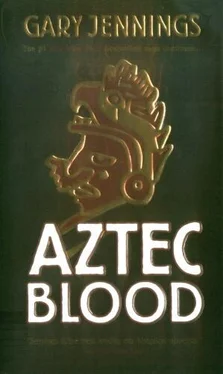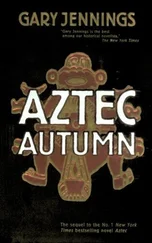Gary Jennings - Aztec Blood
Здесь есть возможность читать онлайн «Gary Jennings - Aztec Blood» весь текст электронной книги совершенно бесплатно (целиком полную версию без сокращений). В некоторых случаях можно слушать аудио, скачать через торрент в формате fb2 и присутствует краткое содержание. Жанр: Старинная литература, на английском языке. Описание произведения, (предисловие) а так же отзывы посетителей доступны на портале библиотеки ЛибКат.
- Название:Aztec Blood
- Автор:
- Жанр:
- Год:неизвестен
- ISBN:нет данных
- Рейтинг книги:4 / 5. Голосов: 1
-
Избранное:Добавить в избранное
- Отзывы:
-
Ваша оценка:
- 80
- 1
- 2
- 3
- 4
- 5
Aztec Blood: краткое содержание, описание и аннотация
Предлагаем к чтению аннотацию, описание, краткое содержание или предисловие (зависит от того, что написал сам автор книги «Aztec Blood»). Если вы не нашли необходимую информацию о книге — напишите в комментариях, мы постараемся отыскать её.
Aztec Blood — читать онлайн бесплатно полную книгу (весь текст) целиком
Ниже представлен текст книги, разбитый по страницам. Система сохранения места последней прочитанной страницы, позволяет с удобством читать онлайн бесплатно книгу «Aztec Blood», без необходимости каждый раз заново искать на чём Вы остановились. Поставьте закладку, и сможете в любой момент перейти на страницу, на которой закончили чтение.
Интервал:
Закладка:
"The hell with dreams! Where's the pirate?" someone shouted.
Mateo angrily drew his sword. "The next man who interrupts me will have this pirate spilling his blood."
This was no audience of city folk but rough colonists. A dozen men rose to the challenge, and Mateo was about to take them on when the dwarf and the other actors intervened, pleading with Mateo and forcing him off the stage.
Fray Antonio told me that when plays are presented in Spain, the common people stand closest to the stage and are called mosqueteros, musket bearers, because of the clamor they make and provoke. These vulgares, low vulgar people, pelt the actors with fruit and anything at hand if they do not like the play.
"Country boors!" Mateo yelled as he left.
There was something else he yelled back, a remark on their manhood and their mothers that I dare not repeat even in these secret words. The insult caused several men to draw their swords, which, however, they instantly sheathed when the two actresses placated them with honeyed words and seductive smiles, which implied everything but which would, I'm sure, deliver nothing.
In the meantime the troupe changed plays.
The dwarf explained that a simple Spanish soldier, rather than a Polish king, now trod their earthen stage.
"I am a simple soldier of the king," he said, "whose honor has been offended by the acts of an English pirate."
The actor-pirate bragged offstage, "I have enjoyed legions of Spanish women, by force at first but never with real resistance. They are all natural-born putas, endowed by their mothers in the harlot's art at birth."
The audience roared. Swords rattled, challenges were issued, and the audience was a howling mob. Shouts of ¡chinga su madre!—an aspersion proclaiming carnal knowledge of the man's mother—rocked the assemblage.
"This simple soldier," the dwarf said, waving his hands for silence, "returns from the Italian war to find his wife has been ravaged by an English brigand."
Gasps resounded. Several men shouted, "If he does not wreak vengeance on the Inglés son of a puta, he is no español."
"He is a mujer!" yelled a woman.
The Spanish soldier had no doubt raped and looted his way through Italy, just as the Spaniards to this very day raped and looted their way through New Spain, my very existence mortal proof of that sad fact; but given the temper of the audience, I kept that observation to myself.
The dwarf drew his sword. It was little more than a good-size dagger, but it looked like a broadsword in his diminutive hand. All the while his booming voice reverberated through us. "I have slit the throats of English, French, and Dutch swine, and my sword will drink their blood again."
Had there been a roof on the "theater," the audience's shouts would have blown it off. Men shook their swords and pleaded for the foul marauder to show his face. But discretion was the better part of showmanship. Either the actor was very good or he was very scared. He cowered offstage. I doubted that even the infamous mosqueteros of Seville were as menacing as our sword-swinging, dagger-slinging colonials.
The actresses, who'd sung, danced, seduced, and solicited hat money outright, now came on stage. This time they harmonized, not unmelodically, a ballad venerating the pristine honor and inviolable maidenhoods of Spanish women here, there, and everywhere. But even as they sang, they could not resist kicking up their heels, revealing a great deal of leg, including that now infamous garden of delights palpitating between their thighs. The two nearby priests pretended with elaborate insincerity to avert their voracious gazes.
The brutish English brigand revealed himself. Leaping to the stage, brandishing his sword, he accosted one of the dancers, roaring, "I've had you by force, and now I will have you again."
She was, of course, the wife of the simple soldier. Men in the audience implored her to take her own life rather than disgrace her husband's honor. It was not to be. As if confirming the corsair's earlier remarks, she yielded immediately, offering laughably little resistance. Murderous rage swept through the audience.
The Spanish soldier, played by the dwarf, continued his speech. Gesturing with much sweeping of his cape and doffing of his broad-brimmed caballero's hat, he spoke of the dauntless courage of Spanish men everywhere—of the righteousness of Spain's soldiers, merchants, and humble farmers. Like Mateo, the dwarf was more suited to play the peacock than the goose.
"Honor is not just the right and possession of the nobility," the dwarf orated, "it belongs to all of us who act as men should act. We Spanish are the greatest nation in the world. Our armies are the most powerful, our king the most generous, our culture the most glorious, our men the bravest, our women the fairest and the most virtuous."
Cheers erupted in the audience.
After each speech a singing guitarist serenaded us with ballads extolling the courage of Spanish men, particularly their love of women, honor, and war.
My ornaments are arms,
My pastime is in war,
My bed is cold upon the hill,
My lamp yon star;
My journeyings are long,
My slumbers short and broken;
From hill to hill I wander still,
Kissing thy token.
I ride from land to land,
I sail from sea to sea,—
Some day more kind my fate may find,
Some night kiss you!
Now the play moved quickly. The English freebooter returned again to ravish the soldier's clearly compliant wife, but this time found the soldier waiting for him.
After the dwarf took several bows and made another long speech, a sword fight flared between himself and the buccaneer. After dispatching the blackguard Britainer, he turned to the audience, saying it was now time to settle with his wife.
On this point the men in the audience were unrelenting. Male honor rose and fell on their women's fidelity. No matter how much he loved his wife or loathed her despoiler, her chastity's loss—or the rumor thereof—meant blood revenge. On this count his reputation brooked no slight or doubt or even hesitation.
The audience was blind hot. One man screamed for her head, complaining that she had not forced the brigand to kill her. Another shouted back at him that it wasn't her fault. The marauder's refusal to run her through revealed dishonor on his part, not hers. The two men started pummeling each other, which quickly led to drawn swords. Again the two actresses intervened. Separating the men, they lured each of them to the farthest corners of that blanketed alleyway with sugary words, sensuous smiles, and outrageously preposterous promises.
The actors had no more than got back into position when the dwarf suddenly stopped the action. "Amigos, my apologies. But I have been reminded that since we mount a second production, our troupe is due second recompense."
The picara women, who had extricated themselves from the swordsman with startling aplomb, again sashayed through the crowd, passing their hats. Despite jeering complaints, the money poured in torrents.
I stared at the women, dumbfounded. The performing of comedias seemed little more than rape, pillage, and highway robbery set in a theater—at least the way it was practiced in New Spain. As for the actresses, they only confirmed for me the incomprehensible power of women over men. Madre de Dios, the things these voluptuous vixens make us do worldwide, time out of mind. We are indeed helpless in their hands. At the drop of a garter, a quick come-hither smirk, or the flimsiest hint of chastity debauched, we are irretrievably lost.
True, most of the women I had known were Veracruz prostitutes, but I had seen great ladies from a distance. What little of them I had observed confirmed everything I glimpsed at the Jalapa fair. Women inevitably reduced the brave and the brilliant to drooling imbecility, all the while still believing that as machos hombres we were the ones in charge.
Читать дальшеИнтервал:
Закладка:
Похожие книги на «Aztec Blood»
Представляем Вашему вниманию похожие книги на «Aztec Blood» списком для выбора. Мы отобрали схожую по названию и смыслу литературу в надежде предоставить читателям больше вариантов отыскать новые, интересные, ещё непрочитанные произведения.
Обсуждение, отзывы о книге «Aztec Blood» и просто собственные мнения читателей. Оставьте ваши комментарии, напишите, что Вы думаете о произведении, его смысле или главных героях. Укажите что конкретно понравилось, а что нет, и почему Вы так считаете.











